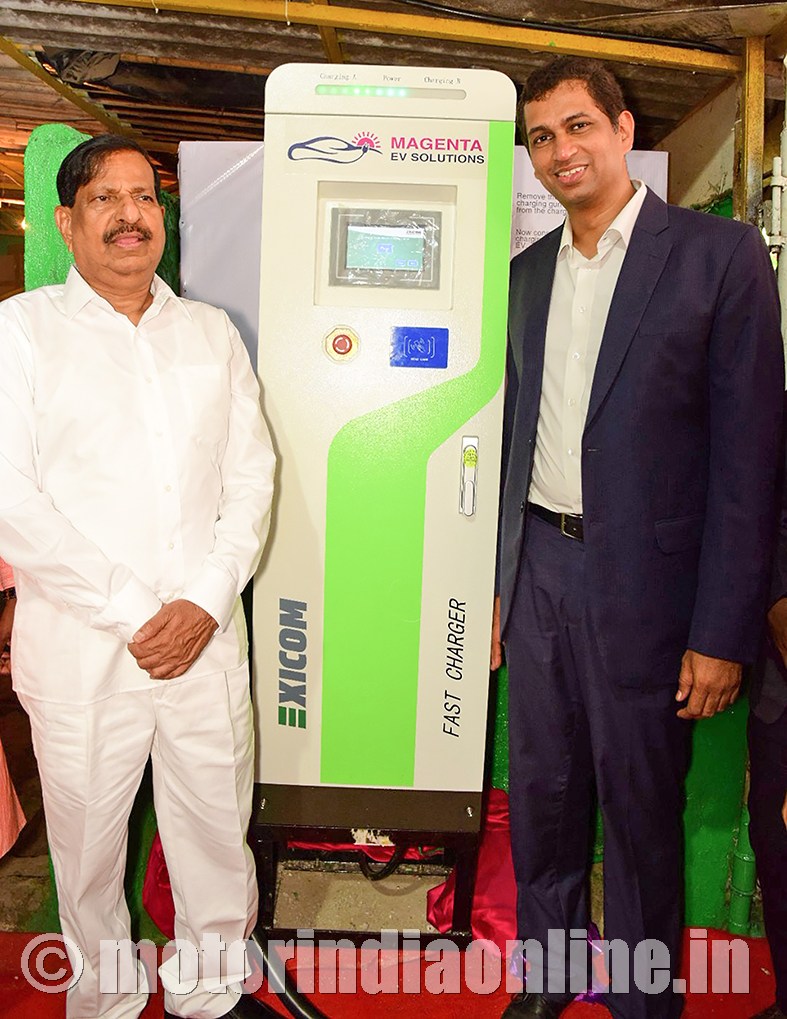Plans for 100 charging stations by 2018-end
Magenta Power, one of the leading service providers of renewable energy solutions, installed India’s first Solar Charging Station (DC Fast Charge) for electric vehicles at an event in Turbhe, Navi Mumbai. The set-up done by Magenta Power was in association with Exicom Tele-Systems Ltd.

The newly-installed charging station will enable electric four-wheelers, cars to start with, to charge their vehicles at any time safely and conveniently. The grid-connected charging station will be powered by solar energy, which, in turn, makes the entire ecosystem totally free of fossil fuel. By reducing the carbon emissions to zero, it is the right solution for an eco-friendly environment.
Speaking at the event, Mr. Maxson Lewis, CEO, Magenta Power, said: “We are very proud to set up our first solar-based electric vehicle charging station in Navi Mumbai. It is also India’s first solar-based EV charging station. Solar panels and electric vehicles are the perfect match that are certainly going to play a key role in the energy systems of the next 25 years. As the nation moves towards clean and affordable power for all, it is our attempt to provide customers with the best solutions for a greener tomorrow”.
The Government undoubtedly has been encouraging the move towards electric vehicles and the shift will be more evident by 2030, understanding which Magenta already has begun its plan to build the seamless network of electric vehicle charging stations, enabling easier adoption among the audience with proximity and making them future ready.
Boosting e-vehicles
Magenta has aggressive plans in EV space and aims to set up 100 charging stations at various locations in Mumbai and is in discussion with various stakeholders to this end. Responding to Motorindia, in the post event Q&A, Mr. Lewis said: “We have installed a 15 Kw DC fast charging station that by itself can run on solar power, but we have provided it with a grid connectivity. Being a DC charger, we are saving time on AC to DC conversion and hence there is no transmission efficiency loss. As per our test it should take around 90 minutes for a battery to get fully charged as against an 8 hours or 6 hours long AC charging of a 45 Kw battery.”
Talking about the synergies between Exicom Tele-Systems Ltd., Mr. Lewis added: “Exicom is our technical partner in terms of the setting up the hardware for charging station, whereas the solar system has been sponsored by Magenta EV Solutions, part of the Magenta Group of companies. The Group companies include Magenta Power, Magenta EV Solutions and Magenta Informatics. We have married Magenta Power and Magenta EV solutions in this case. This location at Turbhe, Navi Mumbai, has been provided by Lifon Industries which is in close proximity to people accessing the Mumbai-Pune Highway that boasts of good EV traffic in India. We are also planning to have some kind of relaxation place and/or engage them in activities for those 90 minutes of charging.”
On probing the CEO on whether or not he wants to extend the solution to the buses and their fleets, he beamed: “We are speaking to the fleet operators of buses on this route and address their needs. We are keen to help them with battery swapping models if required and we are evaluating the technicalities related to it. School bus owners, staff transportation owners and OEMs would be of our interest.”
Asked about the possibility of an even faster charging, Mr. Suhas Joshi, BU Head – E Mobility and Charging Infrastructure, Exicom Tele-Systems, said: “We have the capability to build charging systems with even 150 Kw capacity. That cannot be used here as it will damage the batteries of these four-wheelers as they are not capable of taking it and die very fast. There are technologies like flash charging and wireless charging. We will provide solutions from which the vehicles benefit the most.”
From cost perspective the whole charging infrastructure could cost around Rs. 15 lakhs and, given the higher price of the realty sector, it would further go up. Asked if co-operative housing societies with solar panels can install such hardware in their premises for their captive consumption, Mr. Lewis beamed: “It will attract business for them from outside vehicles as well as promote the society residents to opt for electric vehicles. We have been speaking to a few groups and societies where we have installed solar panels and should be the first ones to do such a thing in this space.”
The charging station, that was unveiled in the presence of Mr. Ganesh Naik, Ex MLA and Member of NCP, can be explored 24×7 by electric vehicle owners free of cost for the next few days. “The intent in the beginning is to not make money but attract people to the use of electric vehicles,” concluded Mr. Lewis.